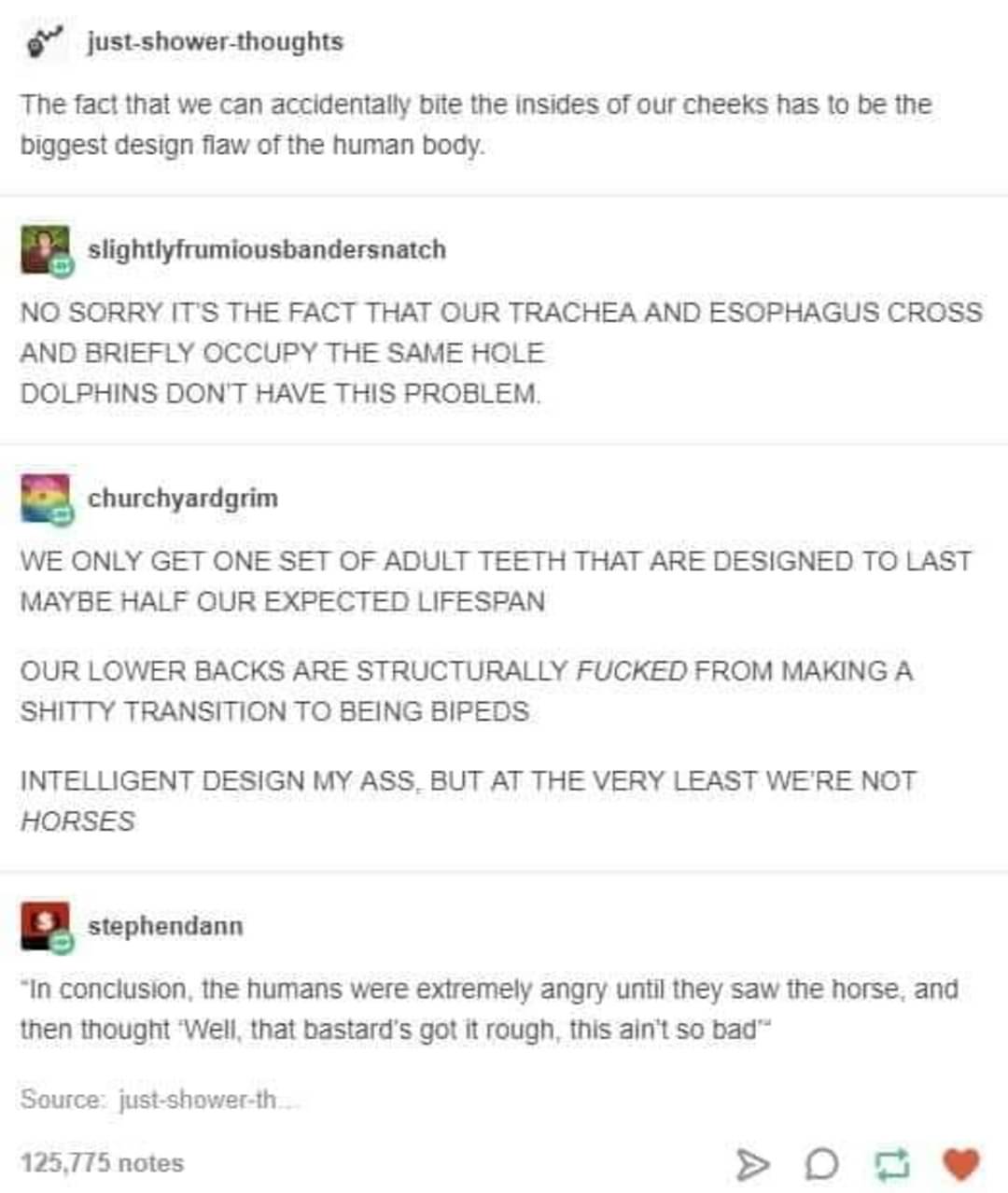this post was submitted on 10 Oct 2024
1203 points (99.4% liked)
Science Memes
11834 readers
564 users here now
Welcome to c/science_memes @ Mander.xyz!
A place for majestic STEMLORD peacocking, as well as memes about the realities of working in a lab.

Rules
- Don't throw mud. Behave like an intellectual and remember the human.
- Keep it rooted (on topic).
- No spam.
- Infographics welcome, get schooled.
This is a science community. We use the Dawkins definition of meme.
Research Committee
Other Mander Communities
Science and Research
Biology and Life Sciences
- [email protected]
- [email protected]
- [email protected]
- [email protected]
- [email protected]
- [email protected]
- [email protected]
- [email protected]
- [email protected]
- [email protected]
- [email protected]
- [email protected]
- [email protected]
- [email protected]
- [email protected]
- [email protected]
- [email protected]
- [email protected]
- [email protected]
- [email protected]
- [email protected]
- [email protected]
- [email protected]
- [email protected]
- !reptiles and [email protected]
Physical Sciences
- [email protected]
- [email protected]
- [email protected]
- [email protected]
- [email protected]
- [email protected]
- [email protected]
- [email protected]
- [email protected]
Humanities and Social Sciences
Practical and Applied Sciences
- !exercise-and [email protected]
- [email protected]
- !self [email protected]
- [email protected]
- [email protected]
- [email protected]
Memes
Miscellaneous
founded 2 years ago
MODERATORS
you are viewing a single comment's thread
view the rest of the comments
view the rest of the comments

That’s completely untrue.
Evolution applies to the entire lifespan — if we could “reproduce” but died in childbirth every time, our species would have gone extinct long ago.
Parents and grandparents also contribute greatly to the success of a child long long after they’re born, helping to ensure it also survives to reproductive age.
"grandparents"
Life expectancy in 18th century France was in the 20s, grandparents are optional
I don't disagree with your overall point, but statistics like that are almost always heavily skewed because of high infant mortality rates
The mortality rate during childbirth was pretty high for women on top of the infant rate. Childbirth as a whole dragged the numbers down.
The mortality of mothers only became a big issue between doctors being in charge of birth and hand washing becoming a rule
The domestication of storks has also led to fewer deaths upon delivery. I wish to also add something to this thread of reddit factoids.
18th century france is also quite possibly the single worst place and point in time to use as a comparison, there's a reason people beheaded monarchs.
[Edit : It turns out people have said the same thing while I was looking for the right source to confirm my point, so I guess this comment's a bit redundant now. Still leaving it in case someone's interested]
The number's correct but...
So reaching 50 wasn't too rare for someone who had survived childhood, and given how people often started having children younger then, that was well enough to be grandparent. Doesn't mean everyone would've gotten to known their grandparents, but it wouldn't have been super rare either.
A reminder that life expectancy in ancient history was so low not because people generally croaked by 40, but because of how many children died young.
It's an average, not a maximum. People regularly lived into their 70s and 80s hundreds of years ago.
From what i've read and heard about the subject, the life expectancy generally looked something like this back in the hunter-gatherer days:
You were very likely to die as an infant, pretty likely to die before puberty, after that you were likely to make it to 40-50, and it wasn't that rare to reach 70.
If you make past childhood for most of history outside of places experiencing plagues, major famines, or wars, you had a good shot of making it to your 70s
https://en.wikipedia.org/wiki/Life_expectancy#Life_expectancy_vs._other_measures_of_longevity
That was an evolutionarily insignificant time period.